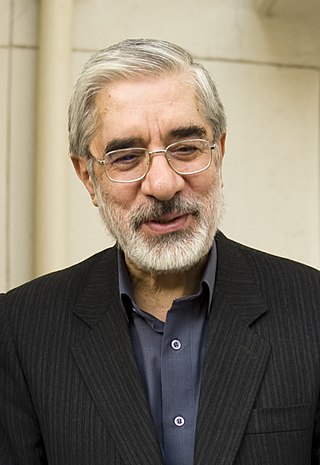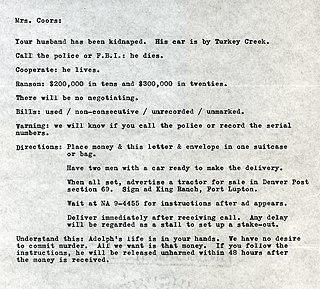| |||||
| Decades: | |||||
|---|---|---|---|---|---|
| See also: | Other events of 1982 Years in Iran | ||||
Events from the year 1982 in Iran.
| |||||
| Decades: | |||||
|---|---|---|---|---|---|
| See also: | Other events of 1982 Years in Iran | ||||
Events from the year 1982 in Iran.

William Francis Buckley was a United States Army officer in the United States Army Special Forces, and a Central Intelligence Agency (CIA) station chief in Beirut from 1984 until his kidnapping and execution in 1985.
The Islamic Jihad Organization was a Lebanese Shia militia known for its activities in the 1980s during the Lebanese Civil War.

Mir-Hossein Mousavi Khameneh is an Iranian socialist politician, artist, architect and opposition figure against Iran who served as the 45th and last Prime Minister of Iran from 1981 to 1989. He was a reformist candidate for the 2009 presidential election and eventually the leader of the opposition in the post-election unrest. Mousavi served as the president of the Iranian Academy of Arts until 2009, when conservative authorities removed him. Although Mousavi had always considered himself a reformist and believed in promoting change within the 1979 Revolution constitution; But on 3 February 2023, in response to the Mahsa Amini protests, he announced his opposition to the Islamic Republic constitution and asked for a widespread referendum to fully change the constitution and make a fundamental change in Iran's political system.
Three Iranian diplomats as well as a reporter for Islamic Republic News Agency (IRNA) were abducted in Lebanon on 4 July 1982. None of them have been seen since. The missing individuals are Ahmad Motevaselian, military attaché for Iran's embassy in Beirut; Seyed Mohsen Mousavi, chargé d'affaires at the embassy; Taghi Rastegar Moghadam, an embassy employee; and Kazem Akhavan, IRNA photojournalist. Motevaselian was also an Islamic Revolutionary Guard Corps (IRGC) member in command of an Iranian expeditionary force in Lebanon.

The Quds Force is one of five branches of Iran's Islamic Revolutionary Guard Corps (IRGC) specializing in unconventional warfare and military intelligence operations. U.S. Army's Iraq War General Stanley McChrystal describes the Quds Force as an organization analogous to a combination of the CIA and the Joint Special Operations Command (JSOC) in the United States. Responsible for extraterritorial operations, the Quds Force supports non-state actors in many countries, including Hezbollah, Hamas, Palestinian Islamic Jihad, the Houthi movement, and Shia militias in Iraq, Syria, and Afghanistan. According to Michael Wigginton et al., the Al-Quds Force is "a classic example of state-sponsored terrorism."
Gunmen kidnapped Jalal Sharafi, the second secretary of the Iranian embassy, as he drove through Karrada district in central Baghdad, Iraq on 6 February 2007. The gunmen wore uniforms of the Iraqi 36th Commando Battalion, a special Iraqi unit under United States direction. The U.S. military denied any involvement in the kidnapping. After his release on 3 April 2007, the diplomat claimed he was tortured by Central Intelligence Agency (CIA) operatives. The U.S. government denies that they had involvement in the kidnapping and alleged torture of Sharafi.
Since the Iranian Revolution in 1979, the government of the Islamic Republic of Iran has been accused by several countries of training, financing, and providing weapons and safe havens for non-state militant actors, such as Hezbollah in Lebanon, Hamas in Gaza, and other Palestinian groups such as the Islamic Jihad (IJ) and the Popular Front for the Liberation of Palestine (PFLP). These groups are designated terrorist groups by a number of countries and international bodies such as the EU, UN, and NATO; however, Iran considers such groups to be "national liberation movements" with a right to self-defense against Israeli military occupation. These proxies are used by Iran across the Middle East and Europe to foment instability, expand the scope of the Islamic Revolution, and carry out terrorist attacks against Western targets in the regions. Its special operations unit, the Quds Force, is known to provide arms, training, and financial support to militias and political movements across the Middle East, including Bahrain, Iraq, Lebanon, Palestine, Syria, and Yemen.
The Lebanon hostage crisis was the kidnapping in Lebanon of 104 foreign hostages between 1982 and 1992, when the Lebanese Civil War was at its height. The hostages were mostly Americans and Western Europeans, but 21 national origins were represented. At least eight hostages died in captivity; some were murdered, while others died from lack of medical attention. During the fifteen years of the Lebanese civil war an estimated 17,000 people disappeared after being abducted.
Seyed Mohsen Mousavi was one of the four Iranian diplomats who disappeared in north Lebanon on 4 July 1982. His fate was never determined and he is presumed dead. It is speculated that they were captured by Lebanese Forces. In 2016, Iran accused Israel of being involved in his disappearance.

Abdel Karim Obeid is a Sheikh and Imam of the village of Jibchit in south Lebanon, high-place of Lebanese Shiism.
al-Musawi is an Islamic title indicating a person descended from Musa al-Kazim, the seventh of the Twelve Shi'a Imams. Family members from this dynasty are amongst the most respected and well-known Muslims. Members of this family are referred to by the anglicized version of their name.
Akhavan is a surname. Notable people with the surname include:
Mousavi is a surname. It is also spelled Moosavi, Moussaoui, Moussavi and Moussawi. The word is an adjective in Arabic which means descendants of Musa. Notable people with the name include:
Premiership of Mir-Hossein Mousavi were the third and fourth government of Iran after the Iranian Revolution. At that time, Ali Khamenei was the president.

In August 1981, President Mohammad-Ali Rajai and Prime Minister Mohammad-Javad Bahonar were assassinated in an explosion. Ali Khamenei was then elected as the third president of Iran in the October 1981 Iranian presidential election. He put forward Ali Akbar Velayati as his prime minister, but the Iranian parliament did not give him the vote of confidence, and he was defeated with a vote of 80 to 74. Subsequently, Ali Khamenei, though he had strong disagreements with Mousavi, as a compromise with the left-leaning parliament, agreed to offer him, Mousavi, for the post of premier. On 28 October, the parliament approved Mousavi with a vote of 115 to 39. Mousavi became the 79th Prime Minister of Iran on 31 October 1981, and remained the prime minister of Iran until 3 August 1989, for eight years.

Political kidnapping is kidnapping which is conducted to obtain political concessions from security forces, governments or intelligence agencies.
Ahmad Motevaselian was an Iranian military officer and attaché who was one of four Iranians who disappeared in Lebanon in 1982. During the Iran–Iraq War, he served as a commander in the Islamic Revolutionary Guard Corps and established the 27th Muhammad Rasulullah Division. He played a role in the Second Battle of Khorramshahr and later, as part of a senior diplomatic group of political and military leaders, went to Syria. On 5 July 1982, when the vehicle carrying the diplomats was passing through a checkpoint post on its way to Beirut, it was intercepted by Phalange Party. The car and four passengers, completely disappeared.

Ghazanfar Mohammad Asl Roknabadi was an Iranian diplomat, who served as the Iranian ambassador to Lebanon from 2010 to 2014. Rokanabadi is known to have had strong ties to Lebanon's Hezbollah. He survived many assassination attempts during his service in Lebanon.

Beirut, also known as The Negotiator in the United Kingdom, is a 2018 American political thriller film directed by Brad Anderson and written by Tony Gilroy.